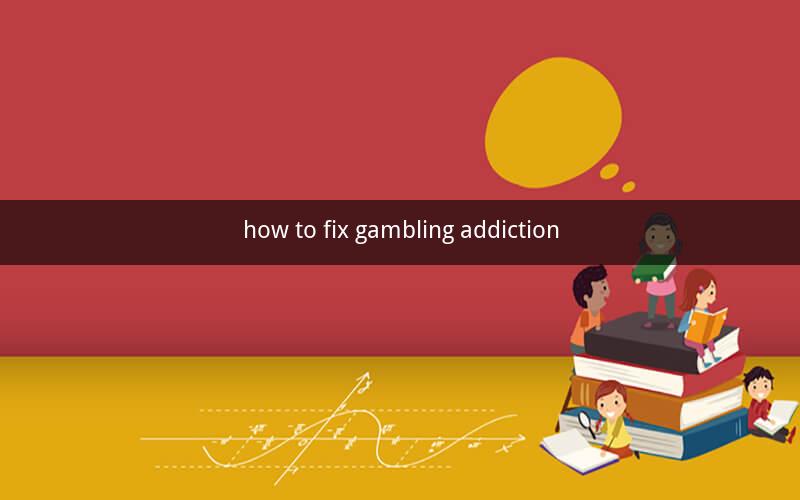
How to Fix Gambling Addiction
Table of Contents
1. Understanding Gambling Addiction
2. The Impact of Gambling Addiction
3. Identifying the Signs of Gambling Addiction
4. The Importance of Professional Help
5. Therapeutic Approaches to Treating Gambling Addiction
6. Self-Help Strategies for Overcoming Gambling Addiction
7. Support Systems and Community Resources
8. The Role of Family and Friends in Recovery
9. The Importance of Financial Literacy
10. Long-Term Strategies for Maintaining Sobriety
1. Understanding Gambling Addiction
Gambling addiction, also known as compulsive gambling, is a behavioral disorder characterized by an inability to control the urge to gamble despite negative consequences. It is a complex condition that can affect individuals of all ages, backgrounds, and socioeconomic statuses. Understanding the nature of gambling addiction is the first step towards overcoming it.
2. The Impact of Gambling Addiction
Gambling addiction can have devastating effects on an individual's life. It can lead to financial ruin, strained relationships, legal problems, and even mental health issues. The impact of gambling addiction extends beyond the individual, affecting families, friends, and the community at large.
3. Identifying the Signs of Gambling Addiction
Recognizing the signs of gambling addiction is crucial for early intervention. Common signs include:
- Preoccupation with gambling, often to the exclusion of other activities
- Needing to gamble with increasing amounts of money to achieve the desired excitement
- Feelings of guilt, remorse, or shame after gambling
- Failed attempts to stop gambling
- Lying to hide the extent of gambling activities
- Risking or losing a significant amount of money, time, or other resources
4. The Importance of Professional Help
Seeking professional help is essential for overcoming gambling addiction. Therapists, counselors, and addiction specialists can provide personalized treatment plans and support throughout the recovery process.
5. Therapeutic Approaches to Treating Gambling Addiction
Several therapeutic approaches can be effective in treating gambling addiction:
- Cognitive Behavioral Therapy (CBT): Helps individuals identify and change negative thought patterns and behaviors associated with gambling.
- Contingency Management: Provides rewards for positive behaviors and consequences for negative behaviors.
- Family Therapy: Assists families in understanding and dealing with the impact of gambling addiction.
- Support Groups: Offers a sense of community and peer support for individuals struggling with gambling addiction.
6. Self-Help Strategies for Overcoming Gambling Addiction
In addition to professional help, individuals can adopt self-help strategies to overcome gambling addiction:
- Setting a budget for gambling activities and sticking to it
- Creating a gambling-free environment
- Engaging in alternative activities to fill the void left by gambling
- Developing healthy coping mechanisms for stress and anxiety
7. Support Systems and Community Resources
Support systems and community resources can play a vital role in the recovery process. These may include:
- Gamblers Anonymous (GA): A 12-step program for individuals struggling with gambling addiction.
- National Council on Problem Gambling (NCPG): Provides resources and support for individuals and families affected by gambling addiction.
- Local support groups and counseling services
8. The Role of Family and Friends in Recovery
Family and friends can provide invaluable support during the recovery process. They can:
- Encourage the individual to seek professional help
- Offer empathy and understanding
- Help create a supportive environment
- Attend support groups or counseling sessions
9. The Importance of Financial Literacy
Understanding and managing finances is crucial for overcoming gambling addiction. Individuals can:
- Create a budget and stick to it
- Seek financial counseling to address any debt or financial issues
- Develop healthy financial habits
10. Long-Term Strategies for Maintaining Sobriety
Maintaining sobriety from gambling addiction requires long-term strategies. These may include:
- Continuing therapy or counseling
- Attending support groups regularly
- Building a strong support network
- Staying vigilant for triggers and warning signs
Frequently Asked Questions
1. What is the most effective treatment for gambling addiction?
- The most effective treatment for gambling addiction varies from person to person. A combination of therapy, support groups, and self-help strategies often yields the best results.
2. Can gambling addiction be cured?
- While there is no cure for gambling addiction, it can be effectively managed and controlled through proper treatment and support.
3. How long does it take to recover from gambling addiction?
- The recovery process can vary significantly, with some individuals experiencing relief within a few months and others taking years to fully recover.
4. Can someone with a gambling addiction be a responsible gambler?
- It is generally not recommended for individuals with gambling addiction to engage in gambling activities, as the risk of relapse is high.
5. What should I do if I suspect a loved one has a gambling addiction?
- Encourage them to seek professional help and offer your support throughout the process. Consider attending support groups or counseling sessions together.
6. Are there any medications that can help treat gambling addiction?
- While there are no medications specifically designed to treat gambling addiction, some medications may be prescribed to address co-occurring mental health issues.
7. How can I help someone who has lost a significant amount of money due to gambling?
- Offer empathy and support, and help them seek professional help. You may also consider helping them develop a budget and financial management plan.
8. Can gambling addiction be prevented?
- While there is no guaranteed way to prevent gambling addiction, being aware of the risks and signs can help individuals take proactive steps to avoid developing an addiction.
9. What is the difference between problem gambling and gambling addiction?
- Problem gambling refers to any gambling behavior that causes distress or harm, while gambling addiction is a severe form of problem gambling characterized by an inability to control gambling behaviors.
10. Can gambling addiction lead to other mental health issues?
- Yes, gambling addiction can lead to other mental health issues, such as depression, anxiety, and substance abuse disorders.